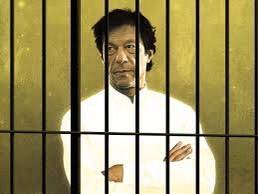Fear of slow poison administration to Imran Khan in Adiala Jail
Shares

Bushra Bibi, the former First Lady, has taken legal action by submitting a petition to advocate for improved conditions for her husband, Imran Khan, who is currently incarcerated in Adiala jail. Within this legal filing, she expressed grave concerns about the quality of food being provided to Khan, revealing that he may be given slow poison in the jail.
This petition was officially lodged in the Islamabad High Court under the representation of Latif Khosa, where she called upon the medical officer to ensure the provision of nutritious and safe meals to the former prime minister during his imprisonment.
In her petition, Bushra Bibi emphasized a disparity between Imran Khan's treatment and that of other inmates. She highlighted that, in the past, prisoners have been granted the privilege of consuming homecooked meals while in detention, yet this privilege has not been extended to her husband, Imran Khan.
Furthermore, she argued that Khan is being denied access to various other entitlements, such as the ability to take walks and engage in exercise while in prison. This situation, she believes, is in direct violation of the fundamental rights guaranteed by articles 9 and 14 of the constitution.
The petition submitted by Bushra Bibi asserts that the treatment meted out to Imran Khan during his incarceration is not only a breach of the constitution but also contradicts a previous order issued by the Islamabad High Court.
It calls attention to the fact that the denial of basic facilities and the questionable quality of food not only undermine Khan's rights but also raise concerns about his overall well-being in Adiala jail. These claims form the basis of her legal plea to ensure that her husband is treated in accordance with the law and provided with the essential amenities that he is entitled to as a prisoner.
In her effort to secure better conditions for Imran Khan, Bushra Bibi's petition underscores the importance of upholding the principles of justice and equality within the legal system. It seeks to address the perceived injustices and shortcomings in the treatment of her husband while incarcerated and calls for immediate corrective measures to rectify these issues.
The Islamabad High Court now faces the responsibility of evaluating the merits of Bushra Bibi's petition and determining whether the rights and entitlements of Imran Khan are indeed being infringed upon during his imprisonment.
This case not only brings attention to the specific circumstances of a prominent political figure but also highlights broader questions about the treatment of prisoners and the enforcement of constitutional rights in the justice system.
In conclusion, Bushra Bibi's legal petition serves as a plea for justice and fairness in the treatment of her husband, Imran Khan, during his time in Adiala jail. It raises concerns about the quality of food, access to basic amenities, and the potential violations of constitutional rights. The outcome of this legal action will have implications not only for the former prime minister but also for the broader discourse on the protection of prisoner rights and adherence to constitutional principles within the judicial system.
